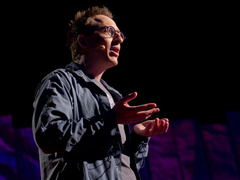
Jon Ronson speaks at TED2012. Photo: James Duncan Davidson
At TED2012, Jon Ronson wove a mind-bending tale that asks: How can we truly tell who is a psychopath? What’s the line between crazy and sane?
 Jon Ronson: Strange answers to the psychopath test
And is it something we can truly delineate, or are we trying to discern black and white in a color-soaked world?
Jon Ronson: Strange answers to the psychopath test
And is it something we can truly delineate, or are we trying to discern black and white in a color-soaked world?
Today’s TEDWeekends on the Huffington Post picks up this question, using Ronson’s talk as a jumping-off point to talk about the concept of “normalcy.” Here, three essays from the weekly HuffPo feature to pique your interest.
Jon Ronson: The Story of a Man Who Faked Insanity
Whenever someone comes on TV or the radio sounding potentially like a psychopath — Lance Armstrong, etc. — we all get drunk with our psychopath spotting powers. I get millions of tweets asking me if they are one. I also get offers to be a talking head on TV. I try to always say no because whilst it would be nice to make hay while the sun shone, it’s quite morally corrosive (not to mention massively unethical) to diagnose someone off the TV.
I tell you who would be even more unethical than me if they went on TV to diagnose someone from afar as a psychopath: any forensic psychiatrist or psychologist or anyone who works in that field as an expert. The Psychopath Test is a cautionary tale to not do that, in fact. It’s as much a book about confirmation bias as it is about psychopaths. Read the full essay »
Dr. Harold Koplewicz: Defending Psychiatrists and the DSM
In Jon Ronson’s rather entertaining TED Talk, he has a little fun at the expense of psychiatrists. That’s fair, but let’s look at what he says. He asks: “Is it possible that the psychiatric profession has a strong desire to label things that are essential human behavior as a disorder?”
To which I would answer: The psychiatric profession has a strong desire to find a way to help people who are suffering — and the family members who struggle alongside them. Suffering is, of course, “essential human behavior,” but when people are miserable, and suicidal, and dangerous to themselves and others, we have an ethical obligation to try to help them. And to alleviate their suffering, we need to understand it. Read the full essay »
Laura Cococcia: Psychopathy, a Cultural Reality?
Stalin, Draper, Caulfield, Salander. No, it’s not the latest name of Mad Men‘s pivotal ad agency. It’s part of a list of people one could classify as psychopaths.
“Strange answers to the psychopath test,” the TED Talk by journalist Jon Ronson, explores the nature and definition of psychopathy. As research, Ronson visits a tough-as-nails CEO he suspects of psychopathy as well as an inmate of a psychiatric facility who claims he pretended to be a psychopath to avoid going to prison. Through the talk, he questions whether psychopathy is a legitimate category of mental illness, or if it’s just a construct we use to explain away actions in our fellow humans that are less than nice, less than normative, that make us non-psychopaths feel uneasy. Read the full essay »
Comments (3)
Pingback: Kalpa Pharma
Pingback: Friday Bites – 12/04/2013 | PsyBites